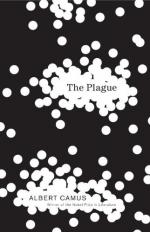|
This section contains 2,473 words (approx. 9 pages at 300 words per page) |

|
Themes in Albert Camus' "The Plague."
Summary: Provides biographical detail on the author Albert Camus. Explores major themes in his novel, "The Plague." Details how Camus attempts to portray the suffocation from which we all suffer, and the atmosphere of menace and exile in which we all live.
Albert Camus was born on the 7th of November 1913 in Mondovi, Algeria to Lucien Camus, whose family had settled in Algeria in 1871, and Catherine Sintes, of Spanish origin. During Camus' high school years, he met Jean Grenier, the man who would influence Camus' career to the greatest extent by opening his mind to the philosophy of thinkers such as Nietzsche and Bergson. He and Grenier focused much of their writing on the duality of mortality.
Still achieving highly at school, Camus received his diploma from the University in philosophy in 1936, examining the legacies and conflicts of thought in his thesis, which would later inhabit his works. The philosophy of moralism he formulated led to his ideas of the absurd, a state which can only exist if God is absent.
As World War II began, Camus moved to Paris where he completed one of his most famous works, The...
|
This section contains 2,473 words (approx. 9 pages at 300 words per page) |

|


